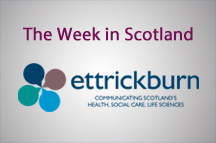 The week had started much like any other in recent post-Brexit referendum history, with the Prime Minister and First Minister agreeing to disagree.
The week had started much like any other in recent post-Brexit referendum history, with the Prime Minister and First Minister agreeing to disagree.
Nicola Sturgeon had joined her Welsh and Northern Irish counterparts in Downing Street for talks with Theresa May. Mrs May cautioned her visitors against ‘undermining’ Brexit negotiations. Ms Sturgeon afterwards expressed her frustration that the trip down to London had failed to yield any greater insight into the thinking of the UK government.
“Brexit might mean Brexit,” said the First Minister, “but the Prime Minister could not tell us exactly what that platitude means in practice.”
As the week went on, the rhetoric from SNP politicians on the issue hardened from talk not of ‘hard’ or ‘soft’ Brexit, but of ‘hard right Brexiteers’ driving Scotland towards a destination that it hasn’t chosen.
 And so it could have continued, had it not been for Caroline Gardner, Auditor General for Scotland. She published the findings of her much anticipated (by those of us who focus on these things) annual check-up of Scotland’s NHS.
And so it could have continued, had it not been for Caroline Gardner, Auditor General for Scotland. She published the findings of her much anticipated (by those of us who focus on these things) annual check-up of Scotland’s NHS.
In simple terms, the NHS in Scotland is operating beyond its means. A budget of £12.2 billion, an increase of 2.7 per cent, isn’t enough to meet demands. Scotland’s NHS Boards are finding it difficult to balance the books. The workforce is ageing and recruiting new people is challenging.
All problems for the NHS are fertile ground for Scotland’s opposition parties because, for many of the nine years since the SNP came to power at Holyrood, Nicola Sturgeon was the Health Secretary. Opposition leaders duly weighed in at First Minister’s Question Time. Scottish Conservative leader Ruth Davidson accused the First Minister of adopting ‘sticking plaster solutions’. Her Labour counterpart, Kezia Dugdale, talked of a ‘grim diagnosis’.
The Auditor General, in common with all the parties at Holyrood, accepts that the big strategy to shift the balance of care from hospitals to communities is the right one for a sustainable NHS. This has seen the creation this year of 31 integrated health and social care partnerships bringing together NHS primary and community services with the social care provision of councils.
Ms Gardner’s main recommendation is that there now needs to be a clear written implementation plan for this process, with clear measures and goals.
Ms Sturgeon responded by revealing that ‘a single delivery framework’ will be published by the end of the year – fulfilling a manifesto promise to review the structure of the NHS and trigger what may be the biggest shake-up since the creation of NHS Boards in 2001.
While some NHS leaders have been predicting a gentle and unthreatening continuation of the administrative evolution brought about by the creation of the partnerships, others believe that a ‘bonfire of the boards’ is on the cards, the 14 local NHS boards being merged to create a handful of regional hospital organisations or possibly a single national body – rendering entire layers of NHS management surplus to requirements.
Which is, of course, quite a risky strategy for a government with its eye on its longed-for prize of Scottish independence. If you are intending to seek their backing in a new referendum, is it wise to upset 165,000 employees, countless patients and the wider Scottish public, by messing too much with the NHS?














